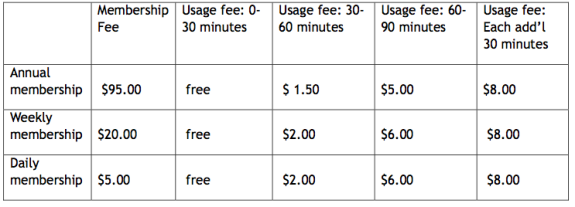
Details on the delayed Vancouver, BC, bike share system have come to light, with government and user costs revealed, new details on helmet vending challenges and a new launch date of early 2014.
Originally scheduled for a spring 2013 launch, the system has been delayed for a variety of reasons, including the crafting of a governmental support agreement and issues creating an effective helmet return solution to go with the planned helmet vending machines.
A document released Wednesday goes into detail about how Vancouver’s deal with Alta Bike Share will work. And while their city’s deal is perfectly acceptable, it also points out what a killer deal Seattle and King County are getting through their partnership with the non-profit Puget Sound Bike Share. PSBS has also selected Alta to operate the King County system.
For example, the Vancouver deal essentially involves the city expecting to put up about $6 million (Canadian, of course) to launch (plus about $1 million in staff time and wayfinding work) and about $500,000 per year to operate the system.
By comparison, Puget Sound Bike Share has been out pursuing as many funding options as possible, and even before counting corporate sponsorships the organization has managed to cobble together half of the funds it needs to launch through various regional and state grants. This means the out-of-pocket launch costs to the city and county budgets will likely be much lower than in Vancouver (Alta and PSBS estimate that Phase I will cost about $3.5 million, and they have secured $1.75 million in grants to date).
Seattle will also benefit from the Vancouver system’s investment in finding a helmet vending solution. Vancouver spent about $60,000 exploring various helmet vending solutions with Alta Bike Share before picking the best. The report specifically notes that Seattle will directly benefit from this research, since King County has a similar all-ages helmet law as British Columbia and our bike share system will need a similar helmet vending solution.
So next time you meet a Vancouverite, say thank you.
More details on the helmet vending progress:
In the end, the solution provided by Alta/PBSC, which consists of an integrated helmet vending machine and helmet return receptacle, was determined to best meet the requirements. The helmet system will include a helmet vending machine and a helmet return receptacle which allow users to rent a bike and a helmet using a single transaction. The Alta/PBSC helmet vending machine is expected to offer two sizes of helmets, with a capacity of approximately thirty helmets per vending machine. The rental and return of a helmet will be tracked using Radio Frequency Identification (RFID) tags on the helmets. Upon return by a user, helmets will be collected by Alta staff and brought to an off-site facility where they will be sanitised and inspected before redistribution.
The helmet vending machines and helmet return receptacles are expected to be fully commissioned and installed as part of the initial testing phase. Currently, Alta/PBSC has developed a prototype of the helmet vending machine while the helmet return receptacle is still in the design stage. Alta/PBSC is confident with their ability to have helmet vending machines and return receptacles ready for both phases of the PBS system launch, including hardware, software and helmet rental and return processes.
But lest you think Vancouver is breaking the bank trying to launch their system, they have come up with an ingenious funding method for their system and future operations: A reserve fund set aside for building new car parking spaces that they have no intention of actually building. That’s right, they are funding bike share by not building car parking spaces:
Staff recommend that the source of funding for the Vancouver PBS project budget ($6 million for one-time equipment purchase and installation, $1 million for one-time start-up staffing, signage and wayfinding costs, and $0.5 million of average annual sustainment costs) be the Parking Site Reserve. Staff will continue to seek additional financial and in-kind contributions from senior governments and other funding partners/philanthropic donors to offset the City’s project costs, anticipated to be a minimum of $1 million.
The Parking Site Reserve was created by Council to fund the construction, maintenance and rehabilitation of the City’s parking facilities, and is funded by revenues generated from EasyPark. As of 2012 year end, the reserve had a balance of $44.7 million. Given that additional parking facilities are not contemplated in the Transportation 2040 Plan, there is more than adequate funding in the reserve for all anticipated capital work required on the City’s parking facilities in the next 10 years, as well as funding for the PBS system.
So while the delays are a concerning omen for those hoping Puget Sound Bike Share stays on track for a spring 2014 launch, Seattle and King County can feel good that we are positioned well to get a good deal on the launch of our system.
Here’s the full Vancouver document from their mayor’s office:
NOTE: I specifically did not focus on helmet laws in this story because the topic tends to take over all other aspects of the bike share story. We have written about the helmet law in a previous post (actually, several posts) and kindly ask that any thoughts about the helmet law be directed there so this post can discuss everything else. Thanks!








Comments
One response to “Vancouver bike share faces delays + King County is getting a sweet deal on bike share launch”
[…] reported recently on Puget Sound Bike Share’s funding progress (and the solid deal the city and county are […]